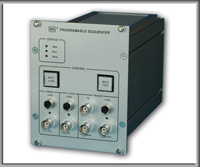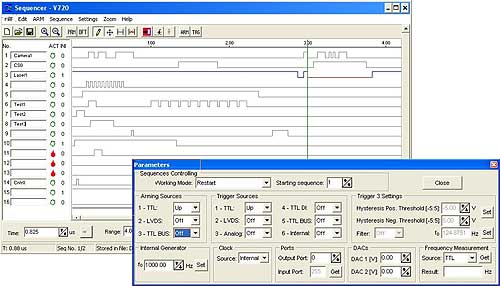| HSD-Sequencer V710-EM |
| HSD-Sequencer V710-EM |
 |
The HSD-Sequencer V710-EM is an EURO module developed for creating complex patterns of pulses (sequences) on multiple outputs. The pulse width, the time interval between pulses, the number of pulses and the output channel number are software programmable.
The sequencer has 16 pulse outputs, Arming inputs, Trigger inputs and External clock input. There is also onboard generator which can be used independently.
The sequencer can work in one of the five Working Modes. The users can define many of pulse sequences which are generated on the outputs depending on Working Mode. Arming and Trigger inputs are used for starting sequences. Additional inputs and outputs can be used to control other equipment in the system.
|
The HSD-Sequencer V710-EM can be
used for triggering of complex scientifical and industrial set-ups applying
various components such as multi-camera systems, pulsed light sources and
accompanying devices. It is particularly useful in machine automation and
electronic testing.
The HSD-Sequencer V710-EM can be made in the compatible version with Sequencer V50/V51E. In this version LVDS outputs are not used.
In the standard-version, Sequencer V710-EM has connector 96 pins. In this version LVDS outputs are not used.
In the extended-version, Sequencer V710-EM has connector 160 pins. The new standard makes possible the use LVDS outputs and TTL outputs.
Due to their flexibility, sequencers can be integrated into several demanding scientific systems (e.g., PIV) for triggering and synchronizing of their components.
|
|
|
 |
Parameters: |
|
 |
Sixteen outputs: TTL
standard, (LVDS standard - option), |
|
|
 |
Five working modes:
Single, Restart, Continue, Trickle, Arming-Continue |
|
|
 |
Inputs: |
Arming1
TTL standard, |
|
|
Arming2 LVDS standard, |
|
|
Arming3 TTL standard, |
|
|
|
 |
Software simulated
Arming functon |
|
|
 |
Programmable active
slope of Arming pulses |
|
|
 |
Inputs: |
Trigger1 TTL standard, |
|
|
Trigger2 LVDS standard, |
|
|
Trigger3 Analog with programmable
Lowpass Filter, |
|
|
Trigger4 TTL standard with
iCoupler Digital Isolator, |
|
|
Trigger5 TTL standard |
|
|
|
 |
Internal input Trigger
with programmable frequency |
|
|
 |
Software simulated
Trigger functon |
|
|
 |
Inputs: |
Ext. CLK1 TTL
standard |
|
|
Ext. CLK2 LVDS standard |
|
|
|
 |
Minimum delay 50 ns |
|
|
 |
Maximum delay 200 s |
|
|
 |
Minimum pulse width 50 ns |
|
|
 |
Maxmum pulse width 200 s |
|
|
 |
Resolution 50 ns |
|
|
 |
Up to 100 Sequences |
|
|
 |
Up to 130000 events |
|
|
 |
Input to output jitter: 6,25
ns |
|
|
 |
Two channels DAC, resolution
8 bit, 0-5V |
|
|
 |
One additional 8 bit output
ports |
|
|
 |
Four opto-coupler logic inputs |
|
|
Configuration software works under Windows 98/2000/NT/XP. The Sequencer
can be programmed by means of the sequencer software via the RS-232
serial port.
|
|

|
|
|
|
 |
Select
from list: |
|
|